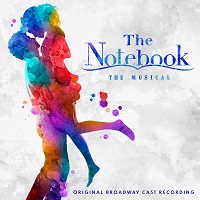 Original Broadway Cast, 2024 (Atlantic)
Original Broadway Cast, 2024 (Atlantic)  (3.5 / 5) The Notebook wears its heart on its sleeve. And why wouldn’t it? From Nicholas Sparks’ novel to Nick Cassavetes’ film to Ingrid Michaelson’s Broadway musical, the story of Noah, a boy from the wrong side of the tracks, and rich girl Allison, who fall in love as teenagers and stay in love for the rest of their lives, has touched people all over the world. The question presented by this cast album is: How many earnest pop ballads about love can fit in one musical? And the answer is, a surprising amount. Michaelson’s music is lush and catchy, and only in the latter part of the score does it begin to feel repetitive. Her lyrics, written more in the pop vein, often deal in false rhymes (“time/mine,” “coin/joy,” etc.), and in doing so, they don’t quite give the ear what it wants. These lyrics also lack some of the specificity that musical theater requires. But where the score comes up short, the wonderful performances of the six leading cast members who play Noah and Allie at three different stages of their lives make up for it. John Cardoza as Young Noah has an especially delightful, buttery voice that lends itself perfectly to Michaelson’s musical style, and the gruff sound of Dorian Harewood as Older Noah provides an excellent contrast to the expansive vocal quality of the four younger performers. One of the album’s greatest losses is Maryann Plunkett’s full performance as Older Allie. Since her character has dementia for the duration of the show, the authors choose not to have her sing until the finale. When Plunkett does sing, and also when she delivers the snippets of dialogue that are included on the recording along the way, she infuses the character with reality, fire, and beauty. Happily, there are plenty of delights even in her absence. If pop artists were still covering songs from musicals, a few numbers in this score could easily be stand-alone hits: “I’ll Leave the Light On,” Middle Noah’s tribute to the lover he’s gone too long without seeing, is deliciously mournful, and “If This Is Love,” Younger Allie’s account of her feelings towards Noah, is an innocent delight. But The Notebook is strongest as a musical theater recording, rather than a pop album, when it deals with more serious topics; “I Want to Go Back,” in which Younger and Middle Allie voice the frustrations of their older counterpart about being forced to stay in a hospital, is likely to give the listener goosebumps with its soaring melody and plaintive lyrics: “Is it time for dinner? / Is it time for forever?” Indeed, any time Noah and Allie sing in harmony across the generations, it’s immensely satisfying to the ear, their voices blending beautifully and hauntingly. These moments of intergenerational connection could’ve been less frequent in order to maximize their impact, but the listener will be grateful for the aural riches that are present. In live performances of The Notebook, the sounds of audience members sniffling, crying, and outright bawling can be heard during the show’s final scenes and even during the curtain calls. Listeners to the cast album may have a similar response, because even if the songwriting isn’t consistently up to par, it’s good enough to deliver a powerful emotional wallop. — Charles Kirsch
(3.5 / 5) The Notebook wears its heart on its sleeve. And why wouldn’t it? From Nicholas Sparks’ novel to Nick Cassavetes’ film to Ingrid Michaelson’s Broadway musical, the story of Noah, a boy from the wrong side of the tracks, and rich girl Allison, who fall in love as teenagers and stay in love for the rest of their lives, has touched people all over the world. The question presented by this cast album is: How many earnest pop ballads about love can fit in one musical? And the answer is, a surprising amount. Michaelson’s music is lush and catchy, and only in the latter part of the score does it begin to feel repetitive. Her lyrics, written more in the pop vein, often deal in false rhymes (“time/mine,” “coin/joy,” etc.), and in doing so, they don’t quite give the ear what it wants. These lyrics also lack some of the specificity that musical theater requires. But where the score comes up short, the wonderful performances of the six leading cast members who play Noah and Allie at three different stages of their lives make up for it. John Cardoza as Young Noah has an especially delightful, buttery voice that lends itself perfectly to Michaelson’s musical style, and the gruff sound of Dorian Harewood as Older Noah provides an excellent contrast to the expansive vocal quality of the four younger performers. One of the album’s greatest losses is Maryann Plunkett’s full performance as Older Allie. Since her character has dementia for the duration of the show, the authors choose not to have her sing until the finale. When Plunkett does sing, and also when she delivers the snippets of dialogue that are included on the recording along the way, she infuses the character with reality, fire, and beauty. Happily, there are plenty of delights even in her absence. If pop artists were still covering songs from musicals, a few numbers in this score could easily be stand-alone hits: “I’ll Leave the Light On,” Middle Noah’s tribute to the lover he’s gone too long without seeing, is deliciously mournful, and “If This Is Love,” Younger Allie’s account of her feelings towards Noah, is an innocent delight. But The Notebook is strongest as a musical theater recording, rather than a pop album, when it deals with more serious topics; “I Want to Go Back,” in which Younger and Middle Allie voice the frustrations of their older counterpart about being forced to stay in a hospital, is likely to give the listener goosebumps with its soaring melody and plaintive lyrics: “Is it time for dinner? / Is it time for forever?” Indeed, any time Noah and Allie sing in harmony across the generations, it’s immensely satisfying to the ear, their voices blending beautifully and hauntingly. These moments of intergenerational connection could’ve been less frequent in order to maximize their impact, but the listener will be grateful for the aural riches that are present. In live performances of The Notebook, the sounds of audience members sniffling, crying, and outright bawling can be heard during the show’s final scenes and even during the curtain calls. Listeners to the cast album may have a similar response, because even if the songwriting isn’t consistently up to par, it’s good enough to deliver a powerful emotional wallop. — Charles Kirsch
All posts by Michael Portantiere
Bloody Bloody Andrew Jackson
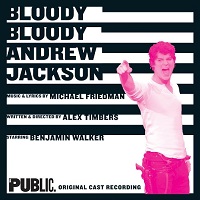 Original Cast, 2010 (Ghostlight)
Original Cast, 2010 (Ghostlight)  (1.5 / 5) Before Hamilton took the world by storm in 2016 with a musical style previously underrepresented on Broadway and a story featuring American historical figures, composer-lyricist Michael Friedman and book writer Alex Timbers utilized similar elements to create Bloody Bloody Andrew Jackson in 2010. The cast album was released following the musical’s successful engagement at the Public Theater and before its disappointing run of 120 performances on Broadway. If the show is certainly no Hamilton, its punk rock score still offers some genuine moments to savor. Take the opening number, “Populism Yea Yea.” Only the most hardened critics could resist banging their heads along to the catchy lyrics. And give a listen to the recording’s final track, “The Hunters of Kentucky,” for another prime example of Friedman’s ability to excite the listener. You won’t have long to wait between those two highlights; the recording is a slight 28 minutes long, making it one of the shortest cast albums ever. Bloody Bloody Andrew Jackson attempts to satirize its title character, played by Benjamin Walker, by portraying him as a foulmouthed, angsty, emo rock star. The idea is to lampoon Jackson’s most controversial decisions and actions by attributing them to his immature, reactive personality, a device that may not register when one is listening to the songs out of context. The score also makes the mistake of glamorizing Jackson’s emotionality as the show goes on, depriving the satire of its bite. Additionally, it should be noted that the original production was widely criticized by Native American activist groups, and subsequent productions have been protested, due to the material’s perceived insensitivity in its depiction of historical events. Comparisons to Hamilton only go so far, given Bloody Bloody Andrew Jackson‘s lack of nuance and the disparity in quality between the two scores. — Forrest Hutchinson
(1.5 / 5) Before Hamilton took the world by storm in 2016 with a musical style previously underrepresented on Broadway and a story featuring American historical figures, composer-lyricist Michael Friedman and book writer Alex Timbers utilized similar elements to create Bloody Bloody Andrew Jackson in 2010. The cast album was released following the musical’s successful engagement at the Public Theater and before its disappointing run of 120 performances on Broadway. If the show is certainly no Hamilton, its punk rock score still offers some genuine moments to savor. Take the opening number, “Populism Yea Yea.” Only the most hardened critics could resist banging their heads along to the catchy lyrics. And give a listen to the recording’s final track, “The Hunters of Kentucky,” for another prime example of Friedman’s ability to excite the listener. You won’t have long to wait between those two highlights; the recording is a slight 28 minutes long, making it one of the shortest cast albums ever. Bloody Bloody Andrew Jackson attempts to satirize its title character, played by Benjamin Walker, by portraying him as a foulmouthed, angsty, emo rock star. The idea is to lampoon Jackson’s most controversial decisions and actions by attributing them to his immature, reactive personality, a device that may not register when one is listening to the songs out of context. The score also makes the mistake of glamorizing Jackson’s emotionality as the show goes on, depriving the satire of its bite. Additionally, it should be noted that the original production was widely criticized by Native American activist groups, and subsequent productions have been protested, due to the material’s perceived insensitivity in its depiction of historical events. Comparisons to Hamilton only go so far, given Bloody Bloody Andrew Jackson‘s lack of nuance and the disparity in quality between the two scores. — Forrest Hutchinson
First Daughter Suite
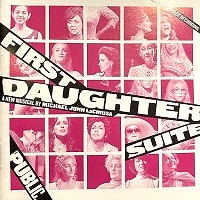 Original Off-Broadway Cast, 2016 (Ghostlight, 2CDs)
Original Off-Broadway Cast, 2016 (Ghostlight, 2CDs)  (4 / 5) One of the great joys of studying and reviewing musical theater cast recordings is tracking the growth and maturity of an artist. Composer-lyricist Michael John LaChuisa has been writing scores for the theater since the 1990s, and his work has continued to develop and expand both musically and dramatically. His score for First Daughter Suite is a high-water mark in both regards. Whereas LaChiusa’s earlier works contained snatches of truncated melodies, this score is full of well-crafted, extended musical sequences. A sort of sequel to of his previous musical First Lady Suite, this one portrays the daughters and wives of American Presidents from both political parties in four separate vignettes. The Nixons, Fords, Carters, Reagans, and Bushes are all present, played by a luminous, uniformly excellent, all-female cast. Barbara Walsh portrays Pat Nixon, Alison Fraser doubles as Betty Ford and Nancy Reagan, and Mary Testa plays Barbara Bush, with Rachel Bay Jones and Caissie Levy doing fine character work in multiple roles. Testa, one of the theater’s most unique treasures, is particularly moving here. LaChiusa wrote his most probing and thought-provoking lyrics for her while searching for any crack in the armor of “Granite Granny” Barbara Bush; in describing the feeling of loss she experienced when her young daughter died of leukemia, Mrs. Bush sings the lyric “losing every atom of myself I thought I had” to heartbreaking effect. First Daughter Suite has been captured in its near entirety on this two-disc recording, which even includes a 22-minute track primarily consisting of dialogue between Alison Fraser’s Nancy Reagan and her estranged daughter, Patti Davis (Levy). Each scene represents not only the personal lives of these people but also marks the progression of America’s views on women during the latter part of the 20th century. If one finds LaChiusa’s early works difficult to enjoy, this score is a perfect opportunity to revisit his music and see how his style has evolved. — Forrest Hutchinson
(4 / 5) One of the great joys of studying and reviewing musical theater cast recordings is tracking the growth and maturity of an artist. Composer-lyricist Michael John LaChuisa has been writing scores for the theater since the 1990s, and his work has continued to develop and expand both musically and dramatically. His score for First Daughter Suite is a high-water mark in both regards. Whereas LaChiusa’s earlier works contained snatches of truncated melodies, this score is full of well-crafted, extended musical sequences. A sort of sequel to of his previous musical First Lady Suite, this one portrays the daughters and wives of American Presidents from both political parties in four separate vignettes. The Nixons, Fords, Carters, Reagans, and Bushes are all present, played by a luminous, uniformly excellent, all-female cast. Barbara Walsh portrays Pat Nixon, Alison Fraser doubles as Betty Ford and Nancy Reagan, and Mary Testa plays Barbara Bush, with Rachel Bay Jones and Caissie Levy doing fine character work in multiple roles. Testa, one of the theater’s most unique treasures, is particularly moving here. LaChiusa wrote his most probing and thought-provoking lyrics for her while searching for any crack in the armor of “Granite Granny” Barbara Bush; in describing the feeling of loss she experienced when her young daughter died of leukemia, Mrs. Bush sings the lyric “losing every atom of myself I thought I had” to heartbreaking effect. First Daughter Suite has been captured in its near entirety on this two-disc recording, which even includes a 22-minute track primarily consisting of dialogue between Alison Fraser’s Nancy Reagan and her estranged daughter, Patti Davis (Levy). Each scene represents not only the personal lives of these people but also marks the progression of America’s views on women during the latter part of the 20th century. If one finds LaChiusa’s early works difficult to enjoy, this score is a perfect opportunity to revisit his music and see how his style has evolved. — Forrest Hutchinson
Something’s Afoot
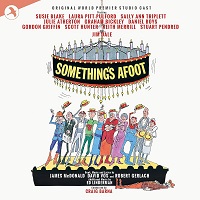 Studio Cast, 2020 (JAY Records)
Studio Cast, 2020 (JAY Records)  (1 / 5) Nearly 50 years after the show’s opening and short-lived stint on Broadway in 1976, this long-awaited studio recording captures the highs and lows of Something’s Afoot, a musical modeled to spoof the stories of Sir Arthur Conan Doyle and Agatha Christie, with particular allusion to Christie’s novel And Then There Were None. The characters, all British stereotypes, are knocked off one by one, and the dialogue on the album does an adequate job of conveying the story beats to the listener. Alas, despite a genre ripe for spoofing, as well as the apparent nostalgia some fans feel for this show, the songs are uninteresting for the most part. Both the music and lyrics are strikingly repetitive, and each song overstays its welcome by a verse or two. The capable cast includes several stage veterans of the West End: Sally Ann Triplett, Laura Pitt-Pulford, Jim Dale, and Susie Blake. They all do their best, but are often forced to resort to over-the-top characterizations in order to sell the mediocre material. Blake plays the show’s primary sleuth, and gets the best songs here. While the score is hardly a rediscovered treasure, other highlights include the jaunty “I Owe It All” and the sweet-sounding but dark finale, “A New Day.” On the other hand, the euphemism-filled “Dinghy” falls completely flat. Those who are already fans of the show from its brief runs on Broadway and then in London will enjoy this recording, but it seems unlikely to win over any new listeners. — Forrest Hutchinson
(1 / 5) Nearly 50 years after the show’s opening and short-lived stint on Broadway in 1976, this long-awaited studio recording captures the highs and lows of Something’s Afoot, a musical modeled to spoof the stories of Sir Arthur Conan Doyle and Agatha Christie, with particular allusion to Christie’s novel And Then There Were None. The characters, all British stereotypes, are knocked off one by one, and the dialogue on the album does an adequate job of conveying the story beats to the listener. Alas, despite a genre ripe for spoofing, as well as the apparent nostalgia some fans feel for this show, the songs are uninteresting for the most part. Both the music and lyrics are strikingly repetitive, and each song overstays its welcome by a verse or two. The capable cast includes several stage veterans of the West End: Sally Ann Triplett, Laura Pitt-Pulford, Jim Dale, and Susie Blake. They all do their best, but are often forced to resort to over-the-top characterizations in order to sell the mediocre material. Blake plays the show’s primary sleuth, and gets the best songs here. While the score is hardly a rediscovered treasure, other highlights include the jaunty “I Owe It All” and the sweet-sounding but dark finale, “A New Day.” On the other hand, the euphemism-filled “Dinghy” falls completely flat. Those who are already fans of the show from its brief runs on Broadway and then in London will enjoy this recording, but it seems unlikely to win over any new listeners. — Forrest Hutchinson
Bernarda Alba
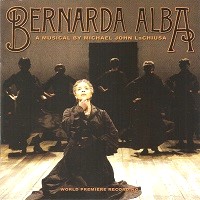 Off-Broadway Cast, 2006 (Ghostlight)
Off-Broadway Cast, 2006 (Ghostlight)  (2.5 / 5) This recording begins with a thrilling and percussive “Prologue” that lays out the haunting story of Bernarda Alba, the recently-widowed mother of five daughters. After her husband’s death, Bernarda refuses to allow any member of her household to leave their home or interact with anyone from the outside world for a set mourning period of eight years. Armed with this concept, the composer, Michael John LaChuisa has packed his score with strong Spanish flamenco beats and rhythms that pay tribute to the source material, Federico Garcia Loca’s drama The House of Bernarda Alba. A strong nod should also be given to Michael Starobin for his fantastic, rhythmic orchestrations throughout the album. But although this musical was certainly an artistic success on stage, it’s difficult to recommend the recording due to LaChiusa’s aversion to melody and song structure. While he has here gifted us with appealing songs such as “Love Let Me Sing You” and “The Smallest Stream,” the bulk of the album is filled with difficult, meandering melodies that hold the listener at arm’s length from what should be a compelling and harrowing story. In the recording’s favor, it does feature Phylicia Rashad as the titular mother. Rashad’s Bernarda is filled with bitterness that has turned to oppressive anger, and she wrings every drop of emotion from the aforementioned “The Smallest Stream.” The rest of the cast of this Lincoln Center Theater production is an abundance of riches, with Saundra Santiago, Judith Blazer, Sally Murphy, Daphne Rubin-Vega, and Nikki M. James as the five daughters. Each of their unique voices are recognizable throughout, but with such an incredible group of performers, it’s a shame they aren’t given more standout material. Overall, this album is not an easy listen; the dark subject matter and complex score make for an intellectually stimulating listening experience, but not always a pleasurable one. — Forrest Hutchinson
(2.5 / 5) This recording begins with a thrilling and percussive “Prologue” that lays out the haunting story of Bernarda Alba, the recently-widowed mother of five daughters. After her husband’s death, Bernarda refuses to allow any member of her household to leave their home or interact with anyone from the outside world for a set mourning period of eight years. Armed with this concept, the composer, Michael John LaChuisa has packed his score with strong Spanish flamenco beats and rhythms that pay tribute to the source material, Federico Garcia Loca’s drama The House of Bernarda Alba. A strong nod should also be given to Michael Starobin for his fantastic, rhythmic orchestrations throughout the album. But although this musical was certainly an artistic success on stage, it’s difficult to recommend the recording due to LaChiusa’s aversion to melody and song structure. While he has here gifted us with appealing songs such as “Love Let Me Sing You” and “The Smallest Stream,” the bulk of the album is filled with difficult, meandering melodies that hold the listener at arm’s length from what should be a compelling and harrowing story. In the recording’s favor, it does feature Phylicia Rashad as the titular mother. Rashad’s Bernarda is filled with bitterness that has turned to oppressive anger, and she wrings every drop of emotion from the aforementioned “The Smallest Stream.” The rest of the cast of this Lincoln Center Theater production is an abundance of riches, with Saundra Santiago, Judith Blazer, Sally Murphy, Daphne Rubin-Vega, and Nikki M. James as the five daughters. Each of their unique voices are recognizable throughout, but with such an incredible group of performers, it’s a shame they aren’t given more standout material. Overall, this album is not an easy listen; the dark subject matter and complex score make for an intellectually stimulating listening experience, but not always a pleasurable one. — Forrest Hutchinson
Big Fish
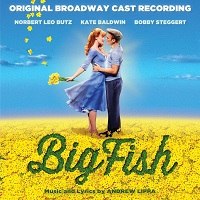 Original Broadway Cast, 2014 (Broadway Records)
Original Broadway Cast, 2014 (Broadway Records)  (3 / 5) Big Fish arrived on Broadway in 2013 with a score by Andrew Lippa and was imaginatively directed by Susan Stroman, but it did not last more than 100 performances. Fortunately, this recording has preserved much of the show’s charm. A strong cast includes Tony Award winner Norbert Leo Butz as Edward Bloom, a yarn-spinning, traveling salesman who dazzles his son, Will (a pleasant-sounding Bobby Steggart), with stories of adventure that stretch the imagination. These oftentimes unbelievable tales strain Edward’s relationship with his son and frustrate his long-suffering wife, played by Kate Baldwin. Butz sounds fantastic throughout; he’s youthful and charming in the opening number, “Be the Hero,” and inspiring in his solo, “Fight the Dragons.” Baldwin’s endearing soprano is much appreciated in softer moments such as the lovely “ I Don’t Need A Roof.” The score culminates with the highly emotional song “How It Ends,” a reconciliation for father and son. Unfortunately, between the effective songs for the main characters, there are several production numbers featuring other characters that do not come across nearly as well on the recording and may serve to make this album a slightly frustrating, but certainly not a profitless, listening experience. — Forrest Hutchinson
(3 / 5) Big Fish arrived on Broadway in 2013 with a score by Andrew Lippa and was imaginatively directed by Susan Stroman, but it did not last more than 100 performances. Fortunately, this recording has preserved much of the show’s charm. A strong cast includes Tony Award winner Norbert Leo Butz as Edward Bloom, a yarn-spinning, traveling salesman who dazzles his son, Will (a pleasant-sounding Bobby Steggart), with stories of adventure that stretch the imagination. These oftentimes unbelievable tales strain Edward’s relationship with his son and frustrate his long-suffering wife, played by Kate Baldwin. Butz sounds fantastic throughout; he’s youthful and charming in the opening number, “Be the Hero,” and inspiring in his solo, “Fight the Dragons.” Baldwin’s endearing soprano is much appreciated in softer moments such as the lovely “ I Don’t Need A Roof.” The score culminates with the highly emotional song “How It Ends,” a reconciliation for father and son. Unfortunately, between the effective songs for the main characters, there are several production numbers featuring other characters that do not come across nearly as well on the recording and may serve to make this album a slightly frustrating, but certainly not a profitless, listening experience. — Forrest Hutchinson
Spongebob Squarepants
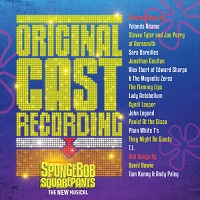 Original Cast, 2017 (Masterworks Broadway)
Original Cast, 2017 (Masterworks Broadway)  (4 / 5) The Spongebob Squarepants album — recorded following the Chicago tryout, before most of the cast transferred to Broadway — succeeds largely through the strange emotive pull it enacts on audiencess who grew up on Nickelodeon. Has there been a more effectively nostalgic musical for the children of the late ’90s? But with a cast digging into impersonations of the TV show’s voice actors, this recording may not have great appeal for Spongebob neophytes. A bevy of songwriters was brought aboard to contribute individual songs to this score, and without director Tina Landau’s unifying stage vision, all of that genre-hopping makes for a bit of a weird listen. (A Cyndi Lauper bop precedes a hymn of praise from gospel artist Yolanda Adams, for example.) But even if the score as a whole feels piecemeal in this context, there are plenty of buoyantly fun tracks on the album. The opening “Bikini Bottom Day,” by Jonathan Coulton, is an especially whimsical earworm with a convincing musical theater structure. Sara Bareilles surprises with a winningly anthemic pirate waltz (“Dentists hate pirate insurance / Which is why we’ve so many gold teeth”), and no less a personage than John Legend provides the show’s only slow ballad, “Miss You,” a sweet duet. Most of the songs for the supporting characters — Carlos López’s Mr. Krabs, Lilli Cooper’s Sandy, and Nick Blaemire’s Plankton — are skippable, while a friendship song for Spongebob and Patrick, “BFF” by Plain White T’s, pales in comparison to a similarly purposed ditty that was introduced on the TV show, “The F.U.N. Song.” But in the titular role, Ethan Slater infuses his uncanny impression with a lovely warmth. Emmy Raver-Lampman also makes a mighty impression as the high-belting whale Pearl. Arranger and orchestrator Tom Kitt is the real MVP of the album, maintaining a joyfully silly tone rooted in musical theater earnestness throughout while surfing musical styles. The score offers lots of auditory in-jokes for Spongebob fans — even the orchestrations and specific instrumentation choices are delightfully referential. And if Spongebob skeptics may be less than fully invested in the storyline, the recording is produced with a glistening mix that makes for a consistently enjoyable listen. — Dan Rubins
(4 / 5) The Spongebob Squarepants album — recorded following the Chicago tryout, before most of the cast transferred to Broadway — succeeds largely through the strange emotive pull it enacts on audiencess who grew up on Nickelodeon. Has there been a more effectively nostalgic musical for the children of the late ’90s? But with a cast digging into impersonations of the TV show’s voice actors, this recording may not have great appeal for Spongebob neophytes. A bevy of songwriters was brought aboard to contribute individual songs to this score, and without director Tina Landau’s unifying stage vision, all of that genre-hopping makes for a bit of a weird listen. (A Cyndi Lauper bop precedes a hymn of praise from gospel artist Yolanda Adams, for example.) But even if the score as a whole feels piecemeal in this context, there are plenty of buoyantly fun tracks on the album. The opening “Bikini Bottom Day,” by Jonathan Coulton, is an especially whimsical earworm with a convincing musical theater structure. Sara Bareilles surprises with a winningly anthemic pirate waltz (“Dentists hate pirate insurance / Which is why we’ve so many gold teeth”), and no less a personage than John Legend provides the show’s only slow ballad, “Miss You,” a sweet duet. Most of the songs for the supporting characters — Carlos López’s Mr. Krabs, Lilli Cooper’s Sandy, and Nick Blaemire’s Plankton — are skippable, while a friendship song for Spongebob and Patrick, “BFF” by Plain White T’s, pales in comparison to a similarly purposed ditty that was introduced on the TV show, “The F.U.N. Song.” But in the titular role, Ethan Slater infuses his uncanny impression with a lovely warmth. Emmy Raver-Lampman also makes a mighty impression as the high-belting whale Pearl. Arranger and orchestrator Tom Kitt is the real MVP of the album, maintaining a joyfully silly tone rooted in musical theater earnestness throughout while surfing musical styles. The score offers lots of auditory in-jokes for Spongebob fans — even the orchestrations and specific instrumentation choices are delightfully referential. And if Spongebob skeptics may be less than fully invested in the storyline, the recording is produced with a glistening mix that makes for a consistently enjoyable listen. — Dan RubinsThe Gardens of Anuncia
 Original Off-Broadway Cast, 2024 (Ghostlight)
Original Off-Broadway Cast, 2024 (Ghostlight)  (4.5 / 5) From the shimmery first notes of The Gardens of Anuncia, listeners will get the feeling they’re entering a magical land. What follows is a gem of a show that tells the story of the upbringing of the great Broadway choreographer Graciela Daniele. (The character here closely based on Daniele is known as Anuncia.) The roles of the three women who raised Daniele, known as “Mami,” “Grandmama,” and “Tia,” are brought to vivid life by Michael John LaChiusa’s extravagant melodies and precise lyrics, and the performers of these roles provide the listener with great gifts: the soaring vocals of Eden Espinosa (Mami), the undeniable charm of Andrea Burns (Tia), and the singular combination of brashness and heart possessed by Mary Testa as Grandmama. (Who else could bring you to the verge of tears with the lyrics “Eat your macaroni!/I don’t want you to be hungry?”) The title role is played dually by Priscilla Lopez, who provides the proper serenity and charm in narrating the show as the older Anuncia, and Kalyn West, who does an admirable job as the innocent, young version of the character, being taught the ways of the world by her three female mentors. The show risks feeling saccharine towards the beginning, as most of the early songs are simply depictions of the happy lives of the four women. But the music is never uninteresting — listeners should not be surprised if they find themselves humming the opening refrain about “Mami, Grandmama, Tia, and me.” The show takes a sharp left turn once Anuncia’s mother is taken as a political prisoner; in “The Vigil,” LaChiusa’s haunting music does justice to the confusion and anxiety every member of the family must have felt during that difficult time. And in “The Story of That Man,” Anuncia stops serving as a secondary character to the women who raised her, coming to the forefront as she shares the traumatic and limited memories she has of her father. Lovely diversions from these more serious moments are provided by two singing deer, both played by Tally Sessions, who appear in the older Anuncia’s garden to impart an important life lesson: “Dance while you can.” Sessions brings a vaudevillian touch to the proceedings, and these numbers brilliantly fit with the rest of the score despite their surface silliness. This show never feels like a vanity project, but Daniele’s ultimate mission in creating it is clear throughout: To give the three strong women who raised her their due. That goal is accomplished with special beauty in the finale, “Never a Goodbye,” in which older Anuncia finally buries the ashes of her aunt. Considering this recording’s many delights, no listener will be sorry that they let LaChiusa and Daniele lead them down this garden path. — Charles Kirsch
(4.5 / 5) From the shimmery first notes of The Gardens of Anuncia, listeners will get the feeling they’re entering a magical land. What follows is a gem of a show that tells the story of the upbringing of the great Broadway choreographer Graciela Daniele. (The character here closely based on Daniele is known as Anuncia.) The roles of the three women who raised Daniele, known as “Mami,” “Grandmama,” and “Tia,” are brought to vivid life by Michael John LaChiusa’s extravagant melodies and precise lyrics, and the performers of these roles provide the listener with great gifts: the soaring vocals of Eden Espinosa (Mami), the undeniable charm of Andrea Burns (Tia), and the singular combination of brashness and heart possessed by Mary Testa as Grandmama. (Who else could bring you to the verge of tears with the lyrics “Eat your macaroni!/I don’t want you to be hungry?”) The title role is played dually by Priscilla Lopez, who provides the proper serenity and charm in narrating the show as the older Anuncia, and Kalyn West, who does an admirable job as the innocent, young version of the character, being taught the ways of the world by her three female mentors. The show risks feeling saccharine towards the beginning, as most of the early songs are simply depictions of the happy lives of the four women. But the music is never uninteresting — listeners should not be surprised if they find themselves humming the opening refrain about “Mami, Grandmama, Tia, and me.” The show takes a sharp left turn once Anuncia’s mother is taken as a political prisoner; in “The Vigil,” LaChiusa’s haunting music does justice to the confusion and anxiety every member of the family must have felt during that difficult time. And in “The Story of That Man,” Anuncia stops serving as a secondary character to the women who raised her, coming to the forefront as she shares the traumatic and limited memories she has of her father. Lovely diversions from these more serious moments are provided by two singing deer, both played by Tally Sessions, who appear in the older Anuncia’s garden to impart an important life lesson: “Dance while you can.” Sessions brings a vaudevillian touch to the proceedings, and these numbers brilliantly fit with the rest of the score despite their surface silliness. This show never feels like a vanity project, but Daniele’s ultimate mission in creating it is clear throughout: To give the three strong women who raised her their due. That goal is accomplished with special beauty in the finale, “Never a Goodbye,” in which older Anuncia finally buries the ashes of her aunt. Considering this recording’s many delights, no listener will be sorry that they let LaChiusa and Daniele lead them down this garden path. — Charles Kirsch
Little Women
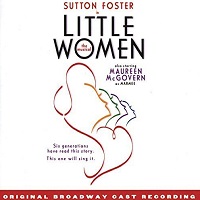 Original Broadway Cast, 2005 (Ghostlight) No stars; not recommended. Among the most unsatisfying of all musicals are those adaptations of classic literature that are poorly crafted but achieve success regardless, because the characters and storytelling of the source material are so beloved as to ensure the musical will garner fans who are not sensitive to the fact that the score is second-, third-, or even fourth-rate. One prime example is Little Women, with music by Jason Howland, lyrics by Mindi Dickstein, and a book by Allan Knee. Although this show inspired by Louisa May Alcott’s novel had only a four-month run on Broadway, it has been frequently produced regionally on both the professional and amateur levels — never mind that the score is serviceable at best and deplorable at worst. Howland’s music is generic, derivative, and exhibits no sense of period style, while Dickstein’s lyrics are prosaic and obvious. One of the most egregious songs to be found here is “Astonishing,” so ineptly written that the one-word title, repeated many times throughout the lyric, is annoyingly set with the accent on the wrong syllable (the final one, rather than the second one). In the role of Jo, Sutton Foster offers performances of this and other songs marked by the sort of extremely unpleasant, pinched and raw high-belting that tends to cause young female audiences to scream approval but is nevertheless a blight on the musical theater. The lovely voices of Danny Gurwin as Laurie, John Weitzer as John Brooke, and especially the great Maureen McGovern as Marmee provide some respite from all that’s going on around them, but given the generally very low quality of the material that they too are given to sing, their contributions are not enough to make this recording worthwhile. The same can be said for the singers heard here in the roles of the other “little women” — Amy McAlexander as Amy, Megan McGinnis as Beth, Jenny Powers as Meg — who also fail to make much of an impression because they have comparatively little to do. According to the nervy marketing blurb on the cast album cover, “Six generations have read this story. This one will sing it.” As was the case with the infamous Cats catch phrase “Now and forever,” one wonders if that’s meant as a promise, a threat, or an ultimatum. — Michael Portantiere
Original Broadway Cast, 2005 (Ghostlight) No stars; not recommended. Among the most unsatisfying of all musicals are those adaptations of classic literature that are poorly crafted but achieve success regardless, because the characters and storytelling of the source material are so beloved as to ensure the musical will garner fans who are not sensitive to the fact that the score is second-, third-, or even fourth-rate. One prime example is Little Women, with music by Jason Howland, lyrics by Mindi Dickstein, and a book by Allan Knee. Although this show inspired by Louisa May Alcott’s novel had only a four-month run on Broadway, it has been frequently produced regionally on both the professional and amateur levels — never mind that the score is serviceable at best and deplorable at worst. Howland’s music is generic, derivative, and exhibits no sense of period style, while Dickstein’s lyrics are prosaic and obvious. One of the most egregious songs to be found here is “Astonishing,” so ineptly written that the one-word title, repeated many times throughout the lyric, is annoyingly set with the accent on the wrong syllable (the final one, rather than the second one). In the role of Jo, Sutton Foster offers performances of this and other songs marked by the sort of extremely unpleasant, pinched and raw high-belting that tends to cause young female audiences to scream approval but is nevertheless a blight on the musical theater. The lovely voices of Danny Gurwin as Laurie, John Weitzer as John Brooke, and especially the great Maureen McGovern as Marmee provide some respite from all that’s going on around them, but given the generally very low quality of the material that they too are given to sing, their contributions are not enough to make this recording worthwhile. The same can be said for the singers heard here in the roles of the other “little women” — Amy McAlexander as Amy, Megan McGinnis as Beth, Jenny Powers as Meg — who also fail to make much of an impression because they have comparatively little to do. According to the nervy marketing blurb on the cast album cover, “Six generations have read this story. This one will sing it.” As was the case with the infamous Cats catch phrase “Now and forever,” one wonders if that’s meant as a promise, a threat, or an ultimatum. — Michael Portantiere
I Can’t Keep Running in Place
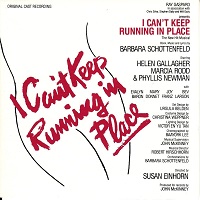 Original Off-Broadway Cast, 1981 (Painted Smiles)
Original Off-Broadway Cast, 1981 (Painted Smiles)  (1 / 5) This musical about a six-week women’s assertiveness training workshop came across as little more than an audition piece for Barbara Schottenfeld, who wrote the book, music, and lyrics. The songs are decent enough, sincere and spirited, even if the music disappears from your mind the moment after you’ve heard it. But the book just isn’t there, and the characters are minimally delineated: the rich and acerbic one, the fat one, the smug student, the doormat, and so on. They occasionally take part in telephone conversations about husbands and children, but mostly they sing one song after another. As performed by Helen Gallagher, Joy Franz, Evalyn Baron, Phyllis Newman, and especially Marcia Rodd in the role of the troubled therapists, the musical numbers are momentarily effective but, without plot or characters to back them up, they’re out there on their own — David Wolf
(1 / 5) This musical about a six-week women’s assertiveness training workshop came across as little more than an audition piece for Barbara Schottenfeld, who wrote the book, music, and lyrics. The songs are decent enough, sincere and spirited, even if the music disappears from your mind the moment after you’ve heard it. But the book just isn’t there, and the characters are minimally delineated: the rich and acerbic one, the fat one, the smug student, the doormat, and so on. They occasionally take part in telephone conversations about husbands and children, but mostly they sing one song after another. As performed by Helen Gallagher, Joy Franz, Evalyn Baron, Phyllis Newman, and especially Marcia Rodd in the role of the troubled therapists, the musical numbers are momentarily effective but, without plot or characters to back them up, they’re out there on their own — David Wolf
Man in the Moon
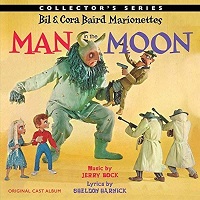 Original Broadway Cast, 1963 (Golden Records/no CD)
Original Broadway Cast, 1963 (Golden Records/no CD)  (2 / 5) The puppets of Bil and Cora Baird were all over early television, as well as being featured in the Broadway musical Flahooley and the film version of The Sound of Music. In the 1960s, Bil Baird attempted a series of theatrical musicals for kids. Some of them were performed in his Greenwich Village jewel box theater, but Man in the Moon actually played on Broadway. The director was Gerald Freedman, the book was written by Arthur Burns (based on a story by Baird), and the songs were by composer Jerry Bock and lyricist Sheldon Harnick. They wrote five numbers for this one-act musical, all of them modest but delightful. (The second acts of Baird’s shows were puppet revues.) In one of the songs, “I Got an Itch,” the gangster-villain sings about having “an itch for a rich, ripe rube I can rob” and tells us that “When night-time comes a-stealing, so do I.” The plot centers on a young boy who goes to the moon by riding a moonbeam but doesn’t realize that gangsters on the lam are right behind him. The gangsters are defeated, and everyone leaves happy — except for Bock and Harnick’s numerous fans, who can’t help thinking about all of the other wonderful shows they might have written as a team if The Rothschilds hadn’t marked their last time working together. — David Wolf
(2 / 5) The puppets of Bil and Cora Baird were all over early television, as well as being featured in the Broadway musical Flahooley and the film version of The Sound of Music. In the 1960s, Bil Baird attempted a series of theatrical musicals for kids. Some of them were performed in his Greenwich Village jewel box theater, but Man in the Moon actually played on Broadway. The director was Gerald Freedman, the book was written by Arthur Burns (based on a story by Baird), and the songs were by composer Jerry Bock and lyricist Sheldon Harnick. They wrote five numbers for this one-act musical, all of them modest but delightful. (The second acts of Baird’s shows were puppet revues.) In one of the songs, “I Got an Itch,” the gangster-villain sings about having “an itch for a rich, ripe rube I can rob” and tells us that “When night-time comes a-stealing, so do I.” The plot centers on a young boy who goes to the moon by riding a moonbeam but doesn’t realize that gangsters on the lam are right behind him. The gangsters are defeated, and everyone leaves happy — except for Bock and Harnick’s numerous fans, who can’t help thinking about all of the other wonderful shows they might have written as a team if The Rothschilds hadn’t marked their last time working together. — David Wolf
Half-Past Wednesday/Rumpelstiltskin
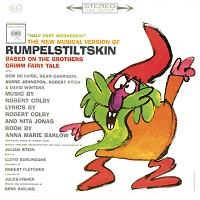 Original Off-Broadway Cast, 1962 (Columbia/no CD) No stars, not recommended. The success of Once Upon a Mattress inspired several other fairy tale musicals, including this one — but the authors of Mattress knew how to adapt their source material for the stage so that it would appeal to adults. In contrast, the writers of Half-Past Wednesday — Robert Colby, Nita Jones, and Anna Marie Barlow — took the story of Rumpelstiltskin and changed almost nothing. This is the original tale: straight, unadorned, and very involving if you’re six years old. The songs aren’t even run-of-the-mill in quality, there’s not a fresh idea to be found here, and despite the fact that the score contains a number of supposedly comic songs, there are no jokes. Columbia tried to repackage and retitle this LP to sell it as a children’s album, but it’s not even clever enough for kids, and they’ll hate the soppy love songs. The most notable member of the cast is Dom DeLuise, most of whose mannerisms were in place by the time of this recording. — David Wolf
Original Off-Broadway Cast, 1962 (Columbia/no CD) No stars, not recommended. The success of Once Upon a Mattress inspired several other fairy tale musicals, including this one — but the authors of Mattress knew how to adapt their source material for the stage so that it would appeal to adults. In contrast, the writers of Half-Past Wednesday — Robert Colby, Nita Jones, and Anna Marie Barlow — took the story of Rumpelstiltskin and changed almost nothing. This is the original tale: straight, unadorned, and very involving if you’re six years old. The songs aren’t even run-of-the-mill in quality, there’s not a fresh idea to be found here, and despite the fact that the score contains a number of supposedly comic songs, there are no jokes. Columbia tried to repackage and retitle this LP to sell it as a children’s album, but it’s not even clever enough for kids, and they’ll hate the soppy love songs. The most notable member of the cast is Dom DeLuise, most of whose mannerisms were in place by the time of this recording. — David Wolf
Fermat’s Last Tango
 Original Off-Broadway Cast, 2002 (Original Cast Records)
Original Off-Broadway Cast, 2002 (Original Cast Records)  (3 / 5) A musical about a math problem? It’s a crazy notion, but composer-lyricist Joshua Rosenblum and librettist-lyricist Joanne Sydney Lessner make it work. Their show was inspired by the controversial last theorem of French mathematician Pierre de Fermat, which has the mythical qualities needed to support a dramatic framework. Fermat’s Last Tango is a bizarre, surprisingly effective, mostly true musical detective story. The creators changes few of the real-life facts beyond renaming the central figure Daniel Keane. Femat himself appears, taunting and yet assisting Keane throughout the show; if the device seems a bit silly at first, it works because of the epic scope of the musical. (Euclid, Newton, Pythagoras, and other mathematicians also appear.) The score is often operatic in weight, and the talented cast is more than up to the challenge. Chris Thompson displays a booming baritone as Keane, Jonathan Rabb’s pompous Fermat is lots of fun, and the members of the ensemble (Christianne Tisdale, Carrie Wilshusen, Gilles Chiasson, and Mitchell Kantor) are excellent. Perhaps the best performance on the cast album comes from Edwardyne Cowan, who plays Keane’s wife. With her beautiful voice, Cowan puts over the show’s one concession to traditional musical comedy, a terrific number titled “Math Widow.” But there are several other enjoyable songs here. Although Fermat’s Last Tango is not recommended as light background music, it’s definitely worth a listen or two. — Matthew Murray
(3 / 5) A musical about a math problem? It’s a crazy notion, but composer-lyricist Joshua Rosenblum and librettist-lyricist Joanne Sydney Lessner make it work. Their show was inspired by the controversial last theorem of French mathematician Pierre de Fermat, which has the mythical qualities needed to support a dramatic framework. Fermat’s Last Tango is a bizarre, surprisingly effective, mostly true musical detective story. The creators changes few of the real-life facts beyond renaming the central figure Daniel Keane. Femat himself appears, taunting and yet assisting Keane throughout the show; if the device seems a bit silly at first, it works because of the epic scope of the musical. (Euclid, Newton, Pythagoras, and other mathematicians also appear.) The score is often operatic in weight, and the talented cast is more than up to the challenge. Chris Thompson displays a booming baritone as Keane, Jonathan Rabb’s pompous Fermat is lots of fun, and the members of the ensemble (Christianne Tisdale, Carrie Wilshusen, Gilles Chiasson, and Mitchell Kantor) are excellent. Perhaps the best performance on the cast album comes from Edwardyne Cowan, who plays Keane’s wife. With her beautiful voice, Cowan puts over the show’s one concession to traditional musical comedy, a terrific number titled “Math Widow.” But there are several other enjoyable songs here. Although Fermat’s Last Tango is not recommended as light background music, it’s definitely worth a listen or two. — Matthew Murray
Cowgirls
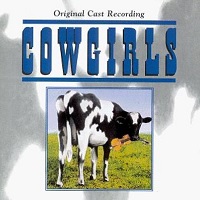 Original Off-Broadway Cast, 1996 (Varèse Sarabande)
Original Off-Broadway Cast, 1996 (Varèse Sarabande)  (2 / 5) This cute little show, with music and lyrics by Mary Murfitt and a book by Betsy Howie, had a decent run Off-Broadway in 1996. The song titles alone — “From Chopin to Country,” “Love’s Sorrow,” “Don’t Call Me Trailer Trash,” “Saddle Tramp Blues,” “They’re All Cowgirls to Me” — give you an idea of what sort of entertainment you’re in for if you give the cast album a listen. The material is very slight but lots of fun, and the charming cast consists of co-author Murfitt and Howie plus Rhonda Coullet, Mary Ehrlinger, Lori Fischer, and Jackie Sanders. They all give their all, and the recording is a pleasant diversion — Michael Portantiere
(2 / 5) This cute little show, with music and lyrics by Mary Murfitt and a book by Betsy Howie, had a decent run Off-Broadway in 1996. The song titles alone — “From Chopin to Country,” “Love’s Sorrow,” “Don’t Call Me Trailer Trash,” “Saddle Tramp Blues,” “They’re All Cowgirls to Me” — give you an idea of what sort of entertainment you’re in for if you give the cast album a listen. The material is very slight but lots of fun, and the charming cast consists of co-author Murfitt and Howie plus Rhonda Coullet, Mary Ehrlinger, Lori Fischer, and Jackie Sanders. They all give their all, and the recording is a pleasant diversion — Michael Portantiere
Greenwich Village U.S.A.
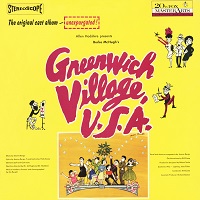 Original Off-Broadway Cast, 1960 (20th Century Fox/no CD) No stars, not recommended. Some people have a blind affection for 1950s and ’60s revues, but being blind doesn’t mean that you have to be deaf, too. There isn’t anything in Greenwich Village U.S.A. that’s worth five seconds of your time. Although the section of New York City that’s the subject of this review was admittedly more distinctive in the ’50s that it has been in later years, it was never exactly Borneo, yet the authors of this show consistently depict its residents as some rare breed of exotics. That basic lack of honesty is one main reason why nothing here is funny. Another reason is the sheer lack of talent displayed in the writing. Those responsible for this fiasco were Jeanne Bargy, composer-lyricist; Frank Gehrecke, book writer-lyricist; and Herb Corey, lyricist. The only item of (minor) interest in this recording is that one of the performers, ballad singer Dawn Hampton, was an early influence on Bette Midler — David Wolf
Original Off-Broadway Cast, 1960 (20th Century Fox/no CD) No stars, not recommended. Some people have a blind affection for 1950s and ’60s revues, but being blind doesn’t mean that you have to be deaf, too. There isn’t anything in Greenwich Village U.S.A. that’s worth five seconds of your time. Although the section of New York City that’s the subject of this review was admittedly more distinctive in the ’50s that it has been in later years, it was never exactly Borneo, yet the authors of this show consistently depict its residents as some rare breed of exotics. That basic lack of honesty is one main reason why nothing here is funny. Another reason is the sheer lack of talent displayed in the writing. Those responsible for this fiasco were Jeanne Bargy, composer-lyricist; Frank Gehrecke, book writer-lyricist; and Herb Corey, lyricist. The only item of (minor) interest in this recording is that one of the performers, ballad singer Dawn Hampton, was an early influence on Bette Midler — David Wolf
The Show Goes On: A Portfolio of Theater Songs by Tom Jones and Harvey Schmidt
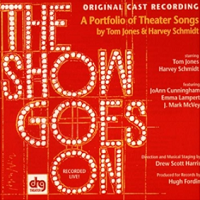 Off-Broadway Cast, 1998 (DRG)
Off-Broadway Cast, 1998 (DRG)  (3 / 5) There are plenty of small delights — simple little things, one might say — to be found in this live recording of the York Theatre Company’s revue, in which lyricist Tom Jones and composer Harvey Schmidt (The Fantasticks, 110 in the Shade, I Do, I Do!, Celebration) offer us a tour through their back catalog. (Suffice it to say this is not an album that will make much sense to anyone who doesn’t know “Soon It’s Gonna Rain” from the “The Rain Song.”) Vocally speaking, none of the three singers — Emma Lampert, Mark McVey, and JoAnn Cunningham — who join the pair of writers offer definitive performances of the well-known songs. And Jones and Schmidt regrettably sing together only for a few of their thinner creations, for example the title number, “The Show Goes On,” from the little-known musical Mirette. But it’s still a thrill to hear Schmidt play piano throughout, especially his impressionist delicacy on “Simple Little Things.” Jones, meanwhile, is the mischievous emcee, gleefully self-effacing (“There are other songs that are more like unrefrigerated fish; they tend to date rather rapidly”) and generous in sharing behind-the-scenes lore. Thrown in here are three different versions of 110 in the Shade’s “Raunchy,” written for various stars who had been courted for that show (including Mary Martin and Carol Burnett), as well as three different melodies for the title song of I Do, I Do! And, despite McVey’s tendency to over-sing, the loveliest surprise on the album is a gorgeous early ballad, “I Know Loneliness Quite Well,” which should be ranked right at the top of Jones and Schmidt’s formidable output. — Dan Rubins
(3 / 5) There are plenty of small delights — simple little things, one might say — to be found in this live recording of the York Theatre Company’s revue, in which lyricist Tom Jones and composer Harvey Schmidt (The Fantasticks, 110 in the Shade, I Do, I Do!, Celebration) offer us a tour through their back catalog. (Suffice it to say this is not an album that will make much sense to anyone who doesn’t know “Soon It’s Gonna Rain” from the “The Rain Song.”) Vocally speaking, none of the three singers — Emma Lampert, Mark McVey, and JoAnn Cunningham — who join the pair of writers offer definitive performances of the well-known songs. And Jones and Schmidt regrettably sing together only for a few of their thinner creations, for example the title number, “The Show Goes On,” from the little-known musical Mirette. But it’s still a thrill to hear Schmidt play piano throughout, especially his impressionist delicacy on “Simple Little Things.” Jones, meanwhile, is the mischievous emcee, gleefully self-effacing (“There are other songs that are more like unrefrigerated fish; they tend to date rather rapidly”) and generous in sharing behind-the-scenes lore. Thrown in here are three different versions of 110 in the Shade’s “Raunchy,” written for various stars who had been courted for that show (including Mary Martin and Carol Burnett), as well as three different melodies for the title song of I Do, I Do! And, despite McVey’s tendency to over-sing, the loveliest surprise on the album is a gorgeous early ballad, “I Know Loneliness Quite Well,” which should be ranked right at the top of Jones and Schmidt’s formidable output. — Dan Rubins
Tuck Everlasting
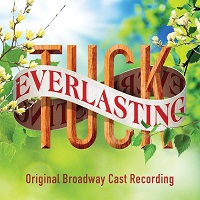 Broadway Cast, 2016 (DMI Soundtracks)
Broadway Cast, 2016 (DMI Soundtracks)  (2 / 5) Not much seems worth immortalizing when it comes to the Broadway adaptation of Natalie Babbitt’s beloved 1975 children’s novel Tuck Everlasting, in which eleven-year-old Winnie meets a family blessed (or is it cursed?) with eternal life. What the cast album does partly capture for prosperity is the creative team’s misguided attempt to stretch Babbitt’s compact storytelling into a two-act musical. The score sags especially in the elongated reveries of Mae Tuck (Carolee Carmello), remembering how her husband loved her back in their double-digit days; the scheming vaudeville turns of the evil Man in the Yellow Suit (a much-put-upon Terrence Man), who has come to steal the immortalizing spring water; and the comic detective numbers for Michael Wartella and Fred Applegate. John Clancy’s folk-doused orchestrations do most of the heavy lifting here, with lots of pizzicato plucks and pan-flute toots doing their best to distract from Chris Miller’s often underdeveloped melodies. Nathan Tysen’s lyrics are marred by a forced series of rhymes such as “handbook” / “exactly as planned, look” / “cranny and nook.” Miller and Tysen do succeed dramatically in “The Story of the Tucks,” in which the family members talk over each other trying to tell Winnie their big secret. Although Sarah Charles Lewis as Winnie sounds older than her pre-teen years, and Andrew Keenan-Bolger sings with a boyish charm, the show never resolves the squeamish courtship between a 104-year-old man in a 17-year-old’s body and an 11-year-old girl (“I’ll wait for you / ’Till you turn seventeen,” he sings in the discomfiting act one finale). Also, the Broadway production’s most-praised sequence, “The Story of Winnie Foster” — a ballet in which Winnie lives a full life and then arrives at a peaceful death in old age — has hardly the same impact without the emotional narrative in the staging. — Dan Rubins
(2 / 5) Not much seems worth immortalizing when it comes to the Broadway adaptation of Natalie Babbitt’s beloved 1975 children’s novel Tuck Everlasting, in which eleven-year-old Winnie meets a family blessed (or is it cursed?) with eternal life. What the cast album does partly capture for prosperity is the creative team’s misguided attempt to stretch Babbitt’s compact storytelling into a two-act musical. The score sags especially in the elongated reveries of Mae Tuck (Carolee Carmello), remembering how her husband loved her back in their double-digit days; the scheming vaudeville turns of the evil Man in the Yellow Suit (a much-put-upon Terrence Man), who has come to steal the immortalizing spring water; and the comic detective numbers for Michael Wartella and Fred Applegate. John Clancy’s folk-doused orchestrations do most of the heavy lifting here, with lots of pizzicato plucks and pan-flute toots doing their best to distract from Chris Miller’s often underdeveloped melodies. Nathan Tysen’s lyrics are marred by a forced series of rhymes such as “handbook” / “exactly as planned, look” / “cranny and nook.” Miller and Tysen do succeed dramatically in “The Story of the Tucks,” in which the family members talk over each other trying to tell Winnie their big secret. Although Sarah Charles Lewis as Winnie sounds older than her pre-teen years, and Andrew Keenan-Bolger sings with a boyish charm, the show never resolves the squeamish courtship between a 104-year-old man in a 17-year-old’s body and an 11-year-old girl (“I’ll wait for you / ’Till you turn seventeen,” he sings in the discomfiting act one finale). Also, the Broadway production’s most-praised sequence, “The Story of Winnie Foster” — a ballet in which Winnie lives a full life and then arrives at a peaceful death in old age — has hardly the same impact without the emotional narrative in the staging. — Dan Rubins
A Christmas Story
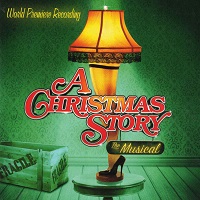 World Premiere Recording, 2012 (Masterworks Broadway)
World Premiere Recording, 2012 (Masterworks Broadway)  (4 / 5) In this stage adaptation of the film of the same title about a boy who really wants a BB gun for Christmas, songwriters Benj Pasek and Justin Paul demonstrate their craft through songs too good-natured and sturdily built to be faulted for their basically pastiche elements. There are jazzy tap numbers, western-inspired romps, and lots of jingling holiday fare with golden-age melodic coutours. The pair clearly had a blast assembling this score, even if the film’s episodic structure doesn’t always lend itself to effective musical storytelling; sequences like “Ralphie to the Rescue” and the endless “A Major Award” suggest that some of the dance arrangements and extended numbers could have been trimmed for the recording. But the otherwise warmly jocular score froths into something more soaring in three tracks that show off Pasek and Paul’s gifts for inventing joyous melody and showcasing kids’ voices: “Counting Down to Christmas,” “Somewhere Hovering Over Indiana,” and the gentle title song are all gems that make a strong case for this album as a keeper. Its warmth and shimmer are largely due to the gorgeous orchestrations of Larry Blank, perhaps some of the best of the 2010s in their brassy clarity and Christmasy sumptuousness. The cast of this “World Premiere Recording” largely represents the 2011 pre-Broadway touring company, with the exceptions of Liz Callaway as Ralphie’s mother and Tom Wopat as the grownup Narrator. (These performers never played these roles on stage.) Callaway is a redemptive presence, her tender, honest tone always keeping the ballads on the safe side of saccharine. And Clarke Hallum makes a meal out of Ralphie’s substantial amount of material, which allow for some astonishingly non-grating pre-teen belting. — Dan Rubins
(4 / 5) In this stage adaptation of the film of the same title about a boy who really wants a BB gun for Christmas, songwriters Benj Pasek and Justin Paul demonstrate their craft through songs too good-natured and sturdily built to be faulted for their basically pastiche elements. There are jazzy tap numbers, western-inspired romps, and lots of jingling holiday fare with golden-age melodic coutours. The pair clearly had a blast assembling this score, even if the film’s episodic structure doesn’t always lend itself to effective musical storytelling; sequences like “Ralphie to the Rescue” and the endless “A Major Award” suggest that some of the dance arrangements and extended numbers could have been trimmed for the recording. But the otherwise warmly jocular score froths into something more soaring in three tracks that show off Pasek and Paul’s gifts for inventing joyous melody and showcasing kids’ voices: “Counting Down to Christmas,” “Somewhere Hovering Over Indiana,” and the gentle title song are all gems that make a strong case for this album as a keeper. Its warmth and shimmer are largely due to the gorgeous orchestrations of Larry Blank, perhaps some of the best of the 2010s in their brassy clarity and Christmasy sumptuousness. The cast of this “World Premiere Recording” largely represents the 2011 pre-Broadway touring company, with the exceptions of Liz Callaway as Ralphie’s mother and Tom Wopat as the grownup Narrator. (These performers never played these roles on stage.) Callaway is a redemptive presence, her tender, honest tone always keeping the ballads on the safe side of saccharine. And Clarke Hallum makes a meal out of Ralphie’s substantial amount of material, which allow for some astonishingly non-grating pre-teen belting. — Dan Rubins
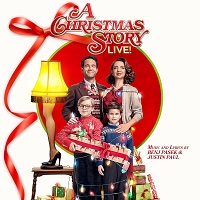 Television Cast, 2017 (Warner Bros.)
Television Cast, 2017 (Warner Bros.)  (4 / 5) The cast album of the live TV production of A Christmas Story sounds splendid, even when compared to the sparkly original recording. Presumably, Larry Blank’s magnificent orchestrations benefit here from larger instrumentation than they received previously. As a result, songs that grew a bit wearisome on the first recording — such as “When You’re A Wimp” and “Sticky Situation” — here have enough big-band pizzazz to hold focus. In the role of the dismissive teacher (“You’ll Shoot Your Eye Out!”), Jane Krakowski is luxury casting. So too is Maya Rudolph; though she’s not a seasoned musical theater performer, she taps into her pre-Saturday Night Live singing background, bringing a wearied edge to “What A Mother Does” and a simple warmth to “Just Like That.” Matthew Broderick’s wistful voice is a good fit for the Narrator. And as young Ralphie, Andy Walken follows formidably in the shoes of Clarke Hallum. With just a tad less musical-theater brightness in his vibrato, Walken has equal emotional heft as his predecessor in the role. For the most part, the track list here matches that of the world premiere recording, with the additions of a forgettable credits song, “Count on Christmas” (performed by pop star Bebe Rexha) and a rather amusing Hanukkah number, “In the Market for A Miracle” (delivered with chutzpah by another SNL alumna with Broadway bona fides, Ana Gasteyer). — D.R.
(4 / 5) The cast album of the live TV production of A Christmas Story sounds splendid, even when compared to the sparkly original recording. Presumably, Larry Blank’s magnificent orchestrations benefit here from larger instrumentation than they received previously. As a result, songs that grew a bit wearisome on the first recording — such as “When You’re A Wimp” and “Sticky Situation” — here have enough big-band pizzazz to hold focus. In the role of the dismissive teacher (“You’ll Shoot Your Eye Out!”), Jane Krakowski is luxury casting. So too is Maya Rudolph; though she’s not a seasoned musical theater performer, she taps into her pre-Saturday Night Live singing background, bringing a wearied edge to “What A Mother Does” and a simple warmth to “Just Like That.” Matthew Broderick’s wistful voice is a good fit for the Narrator. And as young Ralphie, Andy Walken follows formidably in the shoes of Clarke Hallum. With just a tad less musical-theater brightness in his vibrato, Walken has equal emotional heft as his predecessor in the role. For the most part, the track list here matches that of the world premiere recording, with the additions of a forgettable credits song, “Count on Christmas” (performed by pop star Bebe Rexha) and a rather amusing Hanukkah number, “In the Market for A Miracle” (delivered with chutzpah by another SNL alumna with Broadway bona fides, Ana Gasteyer). — D.R.
Days of Wine and Roses
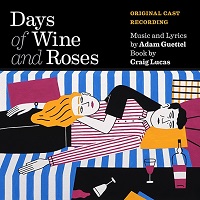 Original Cast, 2023 (Nonesuch)
Original Cast, 2023 (Nonesuch)  (5 / 5) Days of Wine and Roses marks the first musical with a score by composer/lyricist Adam Guettel that has been produced since Guettel’s triumph with The Light in the Piazza in 2005, and it was well worth the wait. Recorded in advance of the show’s Broadway premiere but after its initial production at the Atlantic Theater Company, this cast album is a beautiful gut punch. The music is different from any Broadway score of recent memory — full of earworms without being simple, and harmonically fascinating while remaining deliciously tonal. The orchestrations, which delight the ear, were also provided by Guettel. With a book by Craig Lucas, Days of Wine and Roses is based on the film of the same title. Brian d’Arcy James and Kelli O’Hara star as the show’s central couple, Kirsten Arnesen and Joe Clay, who meet on a boat (the album begins with the sound of rushing waves) and end up embarking on a devastating descent into alcoholism, each pulling the other further down. “Evanesce,” the song that the couple sings when they start drinking together, is a jazzy delight, complicated by ominous lyrics that predict their future (“Two dolphins breaking away / Two dolphins right to the grave/ Are we”). With the exception of the sweet-voiced Ella Dane Morgan as the couple’s young daughter, Lila, hardly any other performers are heard on the album; but James and O’Hara sing so well, and their voices blend so beautifully, that listeners won’t mind at all. O’Hara’s soprano has only become more colorful and expansive since she starred in Piazza, and “There Go I,” a beautiful ballad with evocative lyrics, serves as a showcase for her wondrous talent. “As The Water Loves The Stone” is one of the most heartfelt love songs this reviewer has ever heard, while the couple’s individual “mad scene” songs, “435” and “Morton Salt Girl,” would serve as playgrounds for any actor. The overall tone of the score is very sad, and many listeners may find themselves becoming emotional. It’s hard not to cry during “Turlycue,” the plaintive duet between a suffering mother and a confused daughter, and the joyfulness of “First Breath” becomes quite moving due to the direction of the plot. No musical theater maven should be without this recording; whether it haunts you, inspires you, or even triggers you, it’s certain to have a profound effect. — Charles Kirsch
(5 / 5) Days of Wine and Roses marks the first musical with a score by composer/lyricist Adam Guettel that has been produced since Guettel’s triumph with The Light in the Piazza in 2005, and it was well worth the wait. Recorded in advance of the show’s Broadway premiere but after its initial production at the Atlantic Theater Company, this cast album is a beautiful gut punch. The music is different from any Broadway score of recent memory — full of earworms without being simple, and harmonically fascinating while remaining deliciously tonal. The orchestrations, which delight the ear, were also provided by Guettel. With a book by Craig Lucas, Days of Wine and Roses is based on the film of the same title. Brian d’Arcy James and Kelli O’Hara star as the show’s central couple, Kirsten Arnesen and Joe Clay, who meet on a boat (the album begins with the sound of rushing waves) and end up embarking on a devastating descent into alcoholism, each pulling the other further down. “Evanesce,” the song that the couple sings when they start drinking together, is a jazzy delight, complicated by ominous lyrics that predict their future (“Two dolphins breaking away / Two dolphins right to the grave/ Are we”). With the exception of the sweet-voiced Ella Dane Morgan as the couple’s young daughter, Lila, hardly any other performers are heard on the album; but James and O’Hara sing so well, and their voices blend so beautifully, that listeners won’t mind at all. O’Hara’s soprano has only become more colorful and expansive since she starred in Piazza, and “There Go I,” a beautiful ballad with evocative lyrics, serves as a showcase for her wondrous talent. “As The Water Loves The Stone” is one of the most heartfelt love songs this reviewer has ever heard, while the couple’s individual “mad scene” songs, “435” and “Morton Salt Girl,” would serve as playgrounds for any actor. The overall tone of the score is very sad, and many listeners may find themselves becoming emotional. It’s hard not to cry during “Turlycue,” the plaintive duet between a suffering mother and a confused daughter, and the joyfulness of “First Breath” becomes quite moving due to the direction of the plot. No musical theater maven should be without this recording; whether it haunts you, inspires you, or even triggers you, it’s certain to have a profound effect. — Charles Kirsch
Evening Primrose
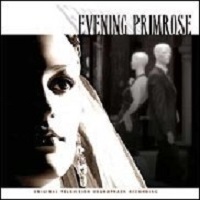 Television Cast, 1966 (Kritzerland)
Television Cast, 1966 (Kritzerland)  (3 / 5) Stephen Sondheim provided a brief but compelling score for this TV musical with a teleplay by James Goldman, based on a short story by John Collier. It tells the odd tale of a struggling poet named Charles, who decides to retreat from society by remaining in a Manhattan department store after closing time; he apparently intends to remain there alone indefinitely, retreating to the store’s nether regions during business hours, but soon he comes upon a small group of people who have decided to do the same thing. Charles falls in love with Ella, a young woman who has lived in the store since early childhood and barely remembers the outside world. In the telecast, Charles was played by Anthony Perkins, Ella by Charmian Carr. No cast album was released until 2008, when Krizerland transferred the soundtrack recordings of the songs to CD. Since it was never a stage musical and is unlikely ever to be one, Evening Primrose doesn’t warrant a lengthy review here, but it must be said that the four-song score contains two of the best ballads Sondheim ever wrote: Ella’s touching reminiscence “I Remember,” and the gorgeous duet “Take Me to the World.” Perkins, who had not very successfully tried his hand as a musical theater leading man in the 1960 Broadway show Greenwillow, is well cast and persuasive as Charles, while Carr, best known for her performance as Liesl in the mega-hit film version of The Sound of Music, is a plaintive Ella. The mid-’60s monaural sound quality of the recording is not great but acceptable. [Note: The full, 52-minute telecast is available separately on home video.] — Michael Portantiere
(3 / 5) Stephen Sondheim provided a brief but compelling score for this TV musical with a teleplay by James Goldman, based on a short story by John Collier. It tells the odd tale of a struggling poet named Charles, who decides to retreat from society by remaining in a Manhattan department store after closing time; he apparently intends to remain there alone indefinitely, retreating to the store’s nether regions during business hours, but soon he comes upon a small group of people who have decided to do the same thing. Charles falls in love with Ella, a young woman who has lived in the store since early childhood and barely remembers the outside world. In the telecast, Charles was played by Anthony Perkins, Ella by Charmian Carr. No cast album was released until 2008, when Krizerland transferred the soundtrack recordings of the songs to CD. Since it was never a stage musical and is unlikely ever to be one, Evening Primrose doesn’t warrant a lengthy review here, but it must be said that the four-song score contains two of the best ballads Sondheim ever wrote: Ella’s touching reminiscence “I Remember,” and the gorgeous duet “Take Me to the World.” Perkins, who had not very successfully tried his hand as a musical theater leading man in the 1960 Broadway show Greenwillow, is well cast and persuasive as Charles, while Carr, best known for her performance as Liesl in the mega-hit film version of The Sound of Music, is a plaintive Ella. The mid-’60s monaural sound quality of the recording is not great but acceptable. [Note: The full, 52-minute telecast is available separately on home video.] — Michael Portantiere
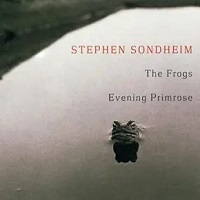 Studio Cast, 2001 (Nonesuch)
Studio Cast, 2001 (Nonesuch)  (4 / 5) The first part of this essential album contains the first commercial recordings of the songs that Sondheim wrote for The Frogs (see separate review, under that title). The second part is devoted to his even-briefer score for Evening Primrose, the 1966 TV musical that concerns the drop-out poet Charles’s encounter with, as Frank Rich phrases it in his notes for this recording, “a mysterious nocturnal society of eccentric shut-ins as well as the muse he’s been searching for, a sort of modern Rapunzel named Ella.” Here, Charles and Ella are sung by Neil Patrick Harris and Theresa McCarthy. Both do fine jobs of delivering the highlights of this mini-musical that are mentioned in the review above, as well as the score’s only other two numbers: Charles’s character-establishing “If You Can Find Me, I’m Here” and the extended duet “When?” All of the songs benefit greatly from Jonathan Tunick’s typically superb orchestrations as played by the American Theatre Orchestra under the baton of Sondheim specialist Paul Gemignani. The CD boasts Nonesuch’s usual, first-rate recorded sound: powerful but not harsh, ambient but not overly reverberant, with great dynamic range. — M.P.
(4 / 5) The first part of this essential album contains the first commercial recordings of the songs that Sondheim wrote for The Frogs (see separate review, under that title). The second part is devoted to his even-briefer score for Evening Primrose, the 1966 TV musical that concerns the drop-out poet Charles’s encounter with, as Frank Rich phrases it in his notes for this recording, “a mysterious nocturnal society of eccentric shut-ins as well as the muse he’s been searching for, a sort of modern Rapunzel named Ella.” Here, Charles and Ella are sung by Neil Patrick Harris and Theresa McCarthy. Both do fine jobs of delivering the highlights of this mini-musical that are mentioned in the review above, as well as the score’s only other two numbers: Charles’s character-establishing “If You Can Find Me, I’m Here” and the extended duet “When?” All of the songs benefit greatly from Jonathan Tunick’s typically superb orchestrations as played by the American Theatre Orchestra under the baton of Sondheim specialist Paul Gemignani. The CD boasts Nonesuch’s usual, first-rate recorded sound: powerful but not harsh, ambient but not overly reverberant, with great dynamic range. — M.P.

